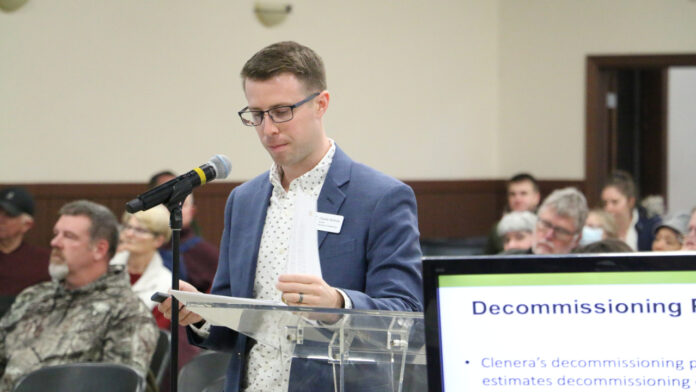UPDATE: The Linn County Board of Supervisors on March 29 formally extended the county’s moratorium on consideration of new industrial-scale solar and wind project proposals for an additional three months A vote on the extension was originally set for the board’s work session March 27, but due to supervisor Ben Rogers’ absence, the board decided […]
UPDATE: The Linn County Board of Supervisors on March 29 formally extended the county’s moratorium on consideration of new industrial-scale solar and wind project proposals for an additional three months
A vote on the extension was originally set for the board’s work session March 27, but due to supervisor Ben Rogers’ absence, the board decided to move formal consideration to the agenda for the March 28 formal board meeting.
The moratorium
was originally approved Oct. 12 and was originally set to expire Dec. 31, but
was extended by the board in late November for an additional three months, to March 31.
As originally approved, the moratorium can be extended at three-month intervals, up to a year, while county staff work and a county-appointed committee work to address recommended improvements in the existing
renewable energy ordinance.
The county’s Planning and Zoning Commission had originally recommended a full-year moratorium, but supervisors modified that recommendation to the three-month window with renewal options up to a year.
Linn County Planning and Development director Charlie Nichols told the board March 29 that the
Renewable Energy Review Committee was set to complete its work by the end of March. That committee was tasked with examining various issues that arose during the county’s review, and eventual approval, of utility-scale solar projects
near Coggon and
near the former Duane Arnold Energy Center.
The issues that arose during those reviews, including buffers, vegetative seedings, agrivoltaics and battery energy storage systems, spurred the push for a moratorium before other projects are presented to the board for consideration.
Once the committee submits a report on its conclusions and recommendations, that report will be channeled to the county’s planning and zoning commission for consideration, then any possible changes would come to the board for consideration and possible implementation.
Earlier, Mr. Nichols said the full process may take more than three months to complete, so another extension of the moratorium may be needed. It could also be ended early if the necessary work is completed before the three-month extension expires, he added.
“I don’t anticipate us receiving an application for another utility-scale solar project before then,” he said.
Supervisor Kirsten Running-Marquardt also noted Monday that she favors the county using formal LESA (Land Evaluation and Site Assessment) criteria as part of its evaluation of future renewable energy products, terming LESA “a brilliant path to go down.”
Mr. Rogers added Wednesday that he felt the new policy will provide better guidance to future applicants for utility-scale renewable energy projects, a sentiment Mr. Nichols echoed.
“I think having applicants know what the county’s stance is moving forward is valuable for all parties,” he said.
Mr. Rogers added that the county’s consideration of the Coggon and Duane Arnold solar projects provided a learning opportunity as various issues arose, and a revamped ordinance should address those issues more fully.
“We’re literally at the finish line,” he said. Would I have liked it to go faster? Sure, but here we are.”
Any changes to the county’s renewable energy ordinance would not apply to the already-approved Coggon, Duane Arnold I and Duane Arnold II solar projects, officials have said.





